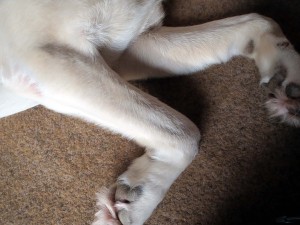The Importance of Joint Health in Dogs.
In this Holidays4Dogs article, we discuss the importance of keeping a dog’s joints in tip top condition; including some hints and tips on exercise and supplements. Additionally, we provide some helpful information on symptoms to look out which might indicate poor joint health in dogs.
In all animals, the bones, cartilage and joints in the skeleton are subject to wear and tear as the animal ages.
animals, the bones, cartilage and joints in the skeleton are subject to wear and tear as the animal ages.
Joint health in dogs is an important thing for owners to be aware of. However, it very much depends on the type of exercise and load (weight), the skeleton has to cope with which determines how well it functions over a lifetime.
Certainly, there are many preventative measures that can be put in place while your dog is young, which will ensure his joints don’t suffer prematurely.
It’s also important to be aware of any discomfort your dog may have with his joints, so that you are able to apply interventions. Veterinary support and care plans, are often crucial to dogs with joint health issues.
Diet.
One of the most important things to get right from the beginning is a quality diet to promote good joint health in dogs. Puppies, like many young animals, grow slowly and they need the correct balanced nutrition. This builds strong structures in the bones and cartilage , for supporting the muscles.
It is crucial that the dog doesn’t become overweight, particularly when they are growing. Being overweight puts unnecessary strain on the developing body, which may affect long term mobility.
Supplements.
Supplements are always worth considering to promote good joint health in dogs. Many proprietary dog foods will often include the main essential ingredients for healthy joints. These often include Glucosamine, Omega-3 fatty acids and antioxidants.
Other foods for healthy joints include; sweet potato, fish oil, turmeric, blueberries and celery. These foods can be given to your dog as healthy snacks.
Exercise.
Additionally, exercise is also an important way to keep a dog’s joints and muscles healthy. However, it is really important not to overdo this with young puppies. Over exercising can cause developmental issues in the growing dog.
A young pup should have short walks and jumping, twisting and climbing should all be avoided. Senior dogs may also benefit from shorter, gentle walks to maintain joint health.
Breed type.
As well as this, large breeds in particular are more susceptible to joint problems. Some, like GSD’s and Newfoundland dogs, are prone to hip and elbow dysplasia. Dogs intended for breeding, should be screened for these two diseases to check for joint health, before producing puppies.
In addition to this, genetics also play a part in the health of joints, so it’s important to make sure you pick a puppy from a reputable breeder.
Dogs from puppy farms, for example, may be prone to severe joint problems, due to inappropriate breeding and poor diet.
How to spot joint health problems in dogs.
One, or all of these signs may indicate joint health problems in your dog;-
Slower to get up from a sitting, or lying-down position.
Sleeping for longer periods.
Difficulty getting in and out of the car, or using stairs.
Licking of joints.
Swollen joints.
Crying, or growling, if a joint is manipulated.
Loss of muscle.
Conclusion.
Any of these signs should prompt the owner to seek veterinary advice on how best to manage joint health in dogs. Less severe joint problems can be managed well with either medication and/or lifestyle adjustments, (such as shorter walks and ramp access to a vehicle).
Overall it can be said – with a little alteration to routine, the majority of dogs with less acute joint problems can still continue to have a good quality of life.
Holidays4dogs.co.uk and 4Dogs are participants in the Amazon Services LLC Associates Program, an affiliate advertising program designed to provide a means for sites to earn commission fees by advertising and linking to the following websites. Read our full disclosure agreement here https://www.holidays4dogs.co.uk/affiliate-disclosure/



